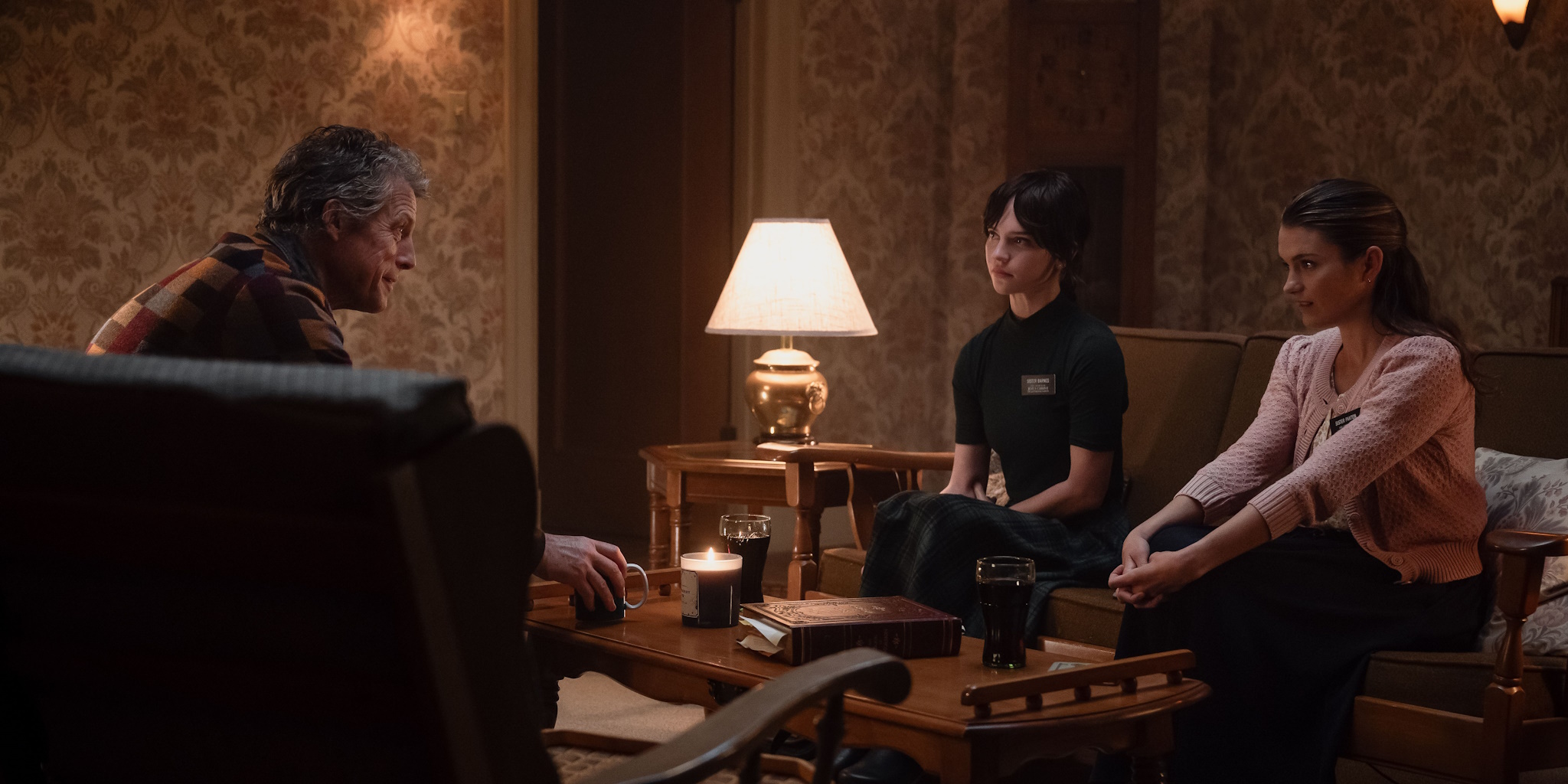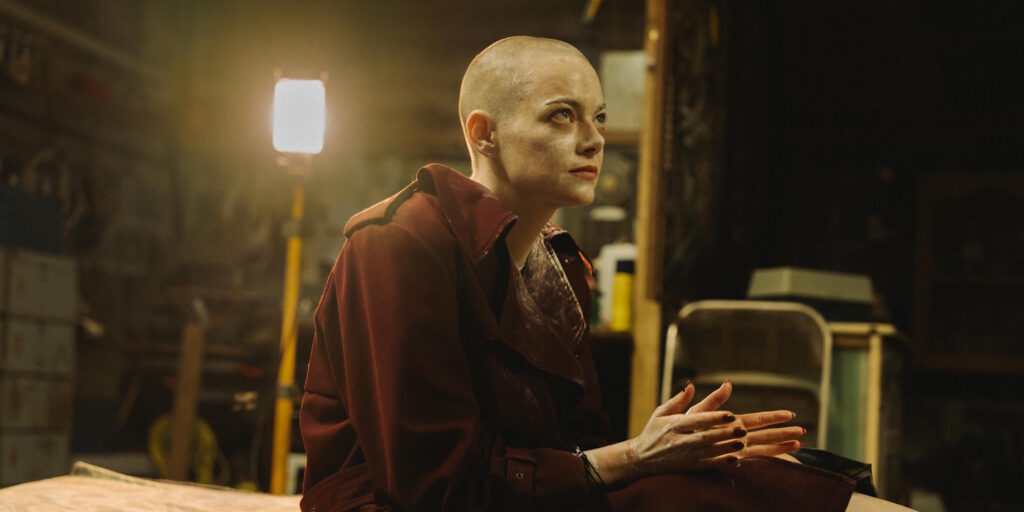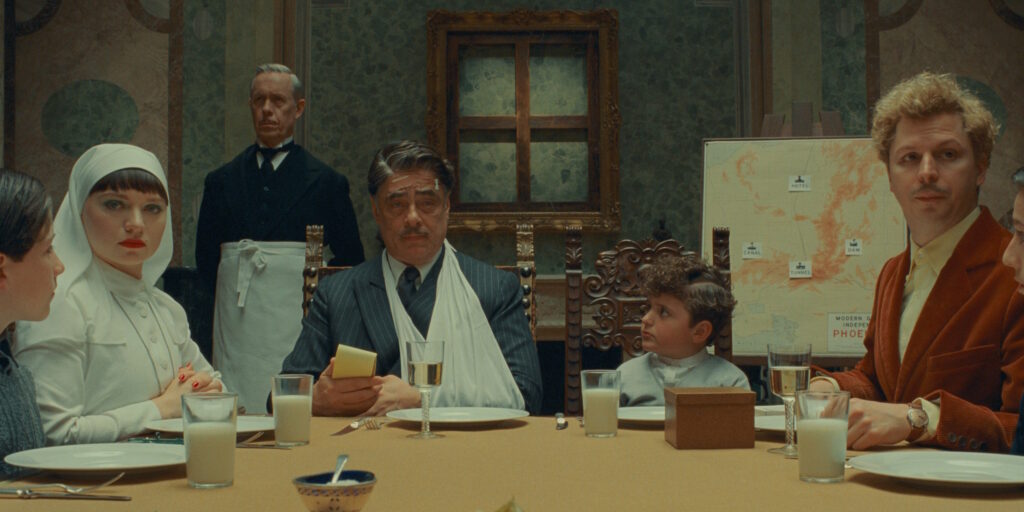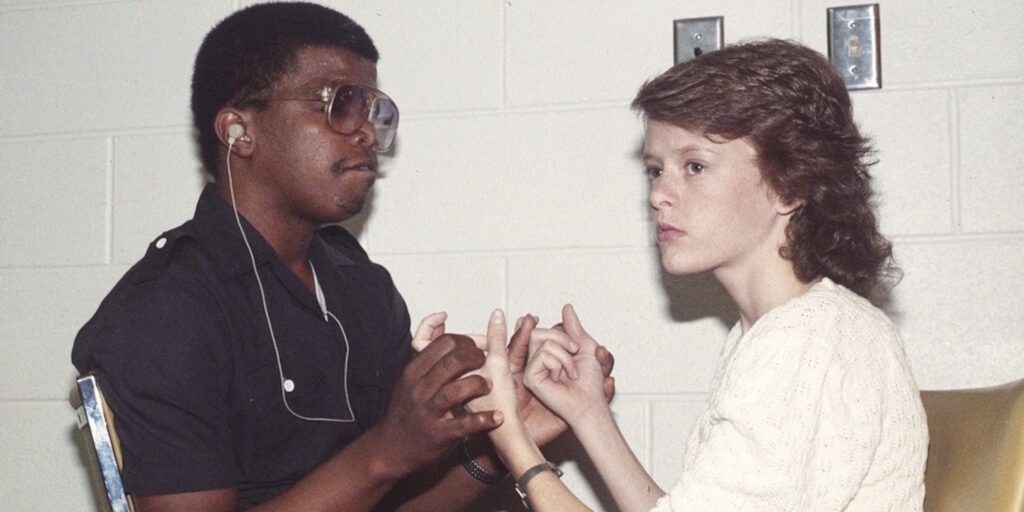Notwithstanding its provocative yet ambiguous title, Heretic is not really a religious horror film. To be sure, the movie features copious dialogue about the tension between belief and disbelief, but writer-directors Scott Beck and Bryan Woods are less interested in matters of the spirit than in watching their poor protagonists squirm like hooked worms. In this, the filmmaking duo – upping their game significantly from such prior, low-rent efforts as Nightlight (2015) and Haunt (2019) – are not that different from their slippery, repulsive villain, Mr. Reed. Portrayed with all the plummy, disarming charisma one would expect from Hugh Grant, Reed presents himself as a humble seeker, a student of the human condition. Yet the sleeve of his autumn-hued sweater conceals a razor blade of manipulative sadism, and his approachable demeanor is just a thin veneer covering a narcissistic craving for dominance.
Under the pretense of learning more about the Church of Jesus Christ of Latter-day Saints (LDS), Reed invites two young female Mormon missionaries, Sister Barnes (Sophie Thatcher) and Sister Paxton (Chloe East), into his secluded suburban home one cold and rainy afternoon. Adhering to the strict gender-segregation rules of their church, the women are reluctant to enter the home of this strange man, but Reed assures them that his wife will join them shortly from the kitchen, once she’s finished attending to her baking blueberry pie. After Reed has the women seated in his cozy (if underlit) living room, he destabilizes them with queries both theological and personal in nature, slowly pulling back the curtain on his motives. Not only does he already know plenty about the LDS Church – his hardcover copy of the Book of Mormon is well thumbed and heavily annotated – but he seems more interested in disingenuously prodding them about their faith’s history than in having a sincere spiritual discussion.
Growing visibly uneasy with the confrontational tenor of the conversation and Reed’s perplexing behavior – he keeps getting up to check on his wife, who has still not appeared – Barnes and Paxton debate the merits of cutting their evangelical losses and just walking out the front door. Alas, their fate was sealed the moment that they crossed their host’s threshold and handed him their wet coats (with their bike-lock key unfortunately in Barnes’ pocket). Reed isn’t actually a prospective convert, of course, or even a workaday argument-enjoyer, but a monster who intends to terrorize this pair of barely adult women with his supposedly towering intellect. He’s every awful stereotype of a smug Reddit atheist in the flesh, less interested in defending his godless worldview than in showing off for a literally captive audience, preferably one that is easily cowed by rhetorical tricks and low-key physical bullying.
Paxton might fit the bill: The childish, embarrassed way she pronounces “pornography” in an early scene with her companion points to a certain guilelessness, as does the breathless way that she follows the church’s proselytization script. Barnes seems to be made of sterner stuff, and not just because she’s played by Yellowjackets bad-girl breakout Thatcher. Both Beck and Woods’ screenplay and the actor’s performance hint at Barnes’ trauma-toughened worldliness, as well as a psychological nimbleness that Reed doesn’t anticipate. However, Heretic’s monster is just as agile, and over the course of the feature’s intense 110 minutes, he repeatedly shifts his tactics in response to the curveballs thrown by his hostages. Reed believes he’s playing Risk while his sheep-like captives are fumbling their way through Candyland, but his smooth-as-shit arrogance is actually a secret weakness. He can’t even fathom the prospect of being outwitted by a pair of Gen Z Mormons – Gen Z Mormon girls, no less.
Befitting a feature in which the villain delights in hearing his own voice, Heretic is a relatively talky horror film. Projecting the cheerful self-importance and latent misogyny of every internet pseudo-intellectual who is “just asking questions,” Reed walks his victims (and thus the audience) through a well-rehearsed knockoff TED talk on Comparative Religions 101. He also touches on a few other topics, like simulation theory and the neuroscience of near-death experiences, but Reed’s beef is with the phenomenon of organized religion generally, which he aims to disprove with some questionable experiments and bravura showmanship. The irony is that while Reed might have a worldview similar to that of vocally godless public intellectuals like Richard Dawkins, Daniel Dennett, and the late Christopher Hitchens, his tactics are pulled from the well-worn playbook of creationists and other religious flimflam artists.
Heretic is at least nominally sympathetic to some of Reed’s arguments, if only in its sincere, horror-tinged acknowledgment that both monotheistic and atheistic worldviews have some unsettling metaphysical implications. (Polytheistic faiths and more philosophical religious movements barely get any lip service.) A viewer’s patience for Heretic might depend on how willing they are to endure Reed’s speechifying alongside poor Sisters Barnes and Paxton. Grant’s scholar-madman doesn’t articulate any particularly revolutionary concepts, and any viewer who has cracked a copy of Bertrand Russell’s Why I Am Not a Christian or Dennet’s Breaking the Spell: Religion as a Natural Phenomenon will find the character’s allegedly devastating philosophical thrusts a bit limp. Which is, admittedly, the whole point: Reed is so impressed with the inescapable, rationalistic trap he’s constructed, he doesn’t notice that his maneuvers are indistinguishable from those of any mansplaining troll.
That Heretic broadly succeeds as a crackerjack horror-thriller – it is Beck and Woods’ best feature to date, by a wide margin – can be attributed in part to Grant’s delightfully malevolent performance. Given that the actor’s romcom reputation was once built on a persona of stammering awkwardness, the most insidious aspect of his portrayal here might be his amiable unflappability. Like a professional social-media sexist who tsk-tsks the overly “emotional” women in his mentions, Reed never seems to lose his equilibrium, even in those brief moments when his victims seize the upper hand. He smiles and cracks wise through it all, whether he’s dropping cringe Star Wars prequel references or digging into human flesh with a utility knife. It isn’t just hard to visualize another actor in the role; it’s difficult to imagine Heretic working at all without Grant’s presence. Thatcher and East also deliver outstanding work in what is essentially a three-hander – the latter proves a pleasantly unexpected revelation – but it’s undeniably Grant’s show.
This is not to imply that Beck and Woods are simply standing back and letting their big-name veteran actor chew the scenery. The filmmaking duo expertly maintain a taut sensation of mounting dread throughout, slowly turning up the temperature until their heroines (and the viewer) are boiling like proverbial frogs. By the time Barnes and Paxton realize they’re in the Mensa-bro version of one of Jigsaw’s moralizing death traps, it’s already too late. The film’s early living-room set piece is a particularly superb work of horror craft, combining mise-en-scène, editing, and sound design to excellent effect. Heretic never quite recaptures the stone-cold assurance of its first act, although it adds enough narrative subversions and left-field Barbarian-esque twists that it doesn’t feel like it’s coasting. Granted, it’s not a completely airtight piece of horror screenwriting: Reed’s villainous scheme involves a little too much Xanatos Speed Chess, and there’s some suggestion that at least one subplot perished in the editing room. (Was that Topher Grace?!) Still, mainstream horror offerings are rarely so satisfying in the awards-season twilight of the calendar year.
Heretic opens in theaters everywhere on Friday, Nov. 8.




